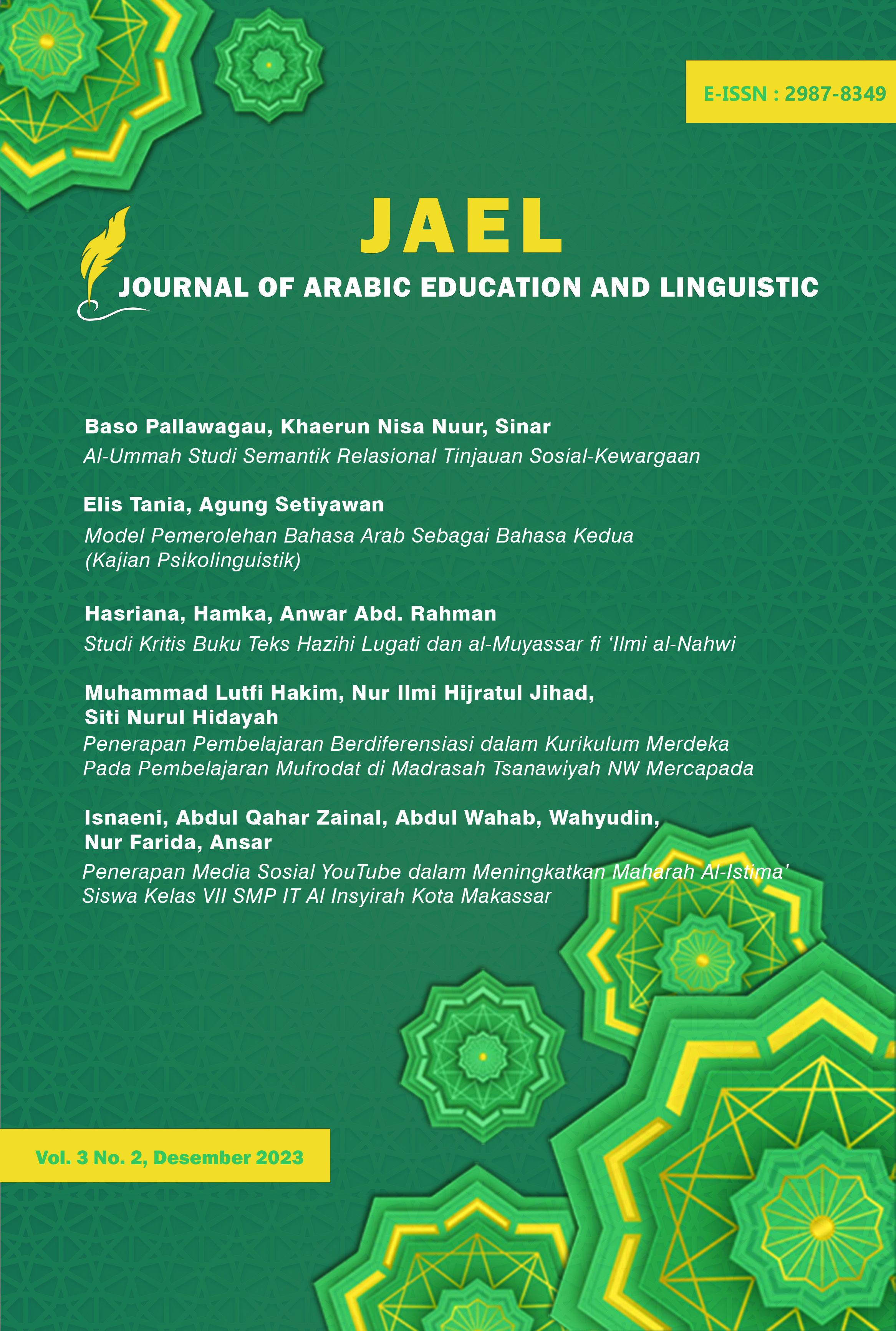Studi Kritis Buku Hazihi Lugati dan al-Muyassar fi Ilmin Nahwi di Pondok Pesantren Tahfizhul Qur'an Imam An-Nasa'i Gowa
Abstrak
Penelitian ini membahas tentang studi kritis buku teks bahasa Arab di Pondok Pesantren Tahfizhul Qur’an Imam An-Nasa’i Gowa pada tingkat wust}a, berdasarkan pada ketercapaian empat keterampilan berbahasa. Adapun tujuan penelitian ini adalah untuk mengetahui bagaimana ketersediaan materi ajar pada buku Ha>z\ihi> Lugati> dan al-Muyassar fi> ’Ilmin Nahwi dalam memenuhi empat keterampilan berbahasa. Jenis penelitian ini termasuk penelitian pustaka (library reseach) dengan jenis analisis deskriptif kualitatif. Sumber data penelitian ini berupa literatur-literatur ilmiah, dokumen hasil wawancara, observasi, dan sumber data pendukung lainnya. Data-data dikumpulkan dari referensi yang dipandang representatif dan dari responden yang memiliki keterkaitan langsung dengan penelitian, data kemudian diklasifikasikan, dipilih dan dikutip sesuai relevansinya dengan persoalan yang dikaji kemudian dianalisis dengan menggunakan pendekatan document study. Hasil penelitian ini menunjukkan, 1) Buku “Ha>z\ihi> Lugati>” dan “al-Muyassar fi> ‘Ilmin Nahwi” diajarkan di Pondok Pesantren Tahfizhul Qur’an Imam An-Nasa’i pada kelas VII-IX, 2) Pada buku “Ha>z\ihi> Lugati>” jilid 1-6 telah menfasilitasi empat keterampilan berbahasa dengan rata-rata setiap keterampilan yaitu 21,30 % istima>‘, 33,57 % kala>m, 23,42 % kita>bah, dan 21,71 % qira>’ah. Ini menunjukkan adanya keseimbangan porsi setiap keterampilan. Sementara pada buku “al-Muyassar fi> ‘Ilmin Nahwi” jilid 1 belum memfasilitasi secara maksimal empat keterampilan berbahasa dengan persentase yang didapatkan adalah 1,75 % istima>‘, 47,37 % kala>m, 42,11 % kita>bah, dan 8,77 % qira>’ah, 3) Berdasarkan analisis isi materi ajar dan jumlah jam pelajaran yang diterapkan terdapat kesenjangan dalam pencapaian target kurikulum bahasa Arab. Maka pihak Pondok Pesantren Tahfizhul Qur’an Imam An-Nasa’i Gowa agar segera melakukan evaluasi target bahan ajar bahasa Arab tingkat wust}a.
Referensi
Aisyah, Siti, Evih Noviyanti dan Triyanto, “Bahan Ajar Sebagai Bagian dalam Kajian Problematika Pembelajaran Bahasa Indonesia,” Jurnal Salaka 2, no. 1 (2020): 62.
Azizah, St.Nur (32 Tahun), Penanggung Jawab Bahasa Arab PPTQ Imam An-Nasa’i, wawancara,Gowa 10 November 2023.
Burhanuddin dan Tim. Profil Pondok Pesantren Tahfizhul Qur’an Imam An-Nasa’i, 2023.
Herdiansyah, Haris. Metodologi Penelitian Kualitatif Untuk Ilmu-Ilmu Sosial. Jakarta: Salemba Humanika, 2010.
Joni, R.T. Pengembangan Paket Belajar, Jakarta: Depdikbud. P2LPTK, 1984.
Mabrurrosi. “Analisis Buku Ajar Bahasa Arab Karya Dr. D. Hidayat.” Jurnal Al-Irfan Vol. 3, no. 2 (2020).
Pptq Imam An-Nasa'i. Ponpen Imam An-Nas’i Borong Juara Pada Porsani di Darul Marhamah Makassar.”, Pptq Imam An-Nasa’i, 2022. https://www.facebook.com/112887464681191/posts/112893718013899/?mibextid=rS40aB7S9Ucbxw6v.
Prastowo, Andi. Panduan Kreatif Membuat Bahan Ajar Inovatif: Menciptakan Metode Pembelajaran Yang Menarik dan Menyenangkan. Cet. IV. Yogyakarta: Diva Press, 2012.
Syaifullah, Muhammad. “Kajian Teoritis Pengembangan Bahan Ajar Bahasa Arab.” Arabiyatuna, Jurnal Bahasa Arab 3, no. 1 (2019): 128.
Syaifullah, Muhammad “Pembelajaran Kooperatif Tipe Make A Match dalam Meningkatkan Penguasaan Kosa Kata Bahasa Arab Santri TPA Al-Barokah Hadimulyo Timur Metro Pusat,” Jurnal At-Ta’dib 11, no. 2 (2016): 81
Tim Penyusun Kurikulum. Kurikulum PPTQ Imam An-Nasa’i, 2020.


 This work is licensed under
This work is licensed under